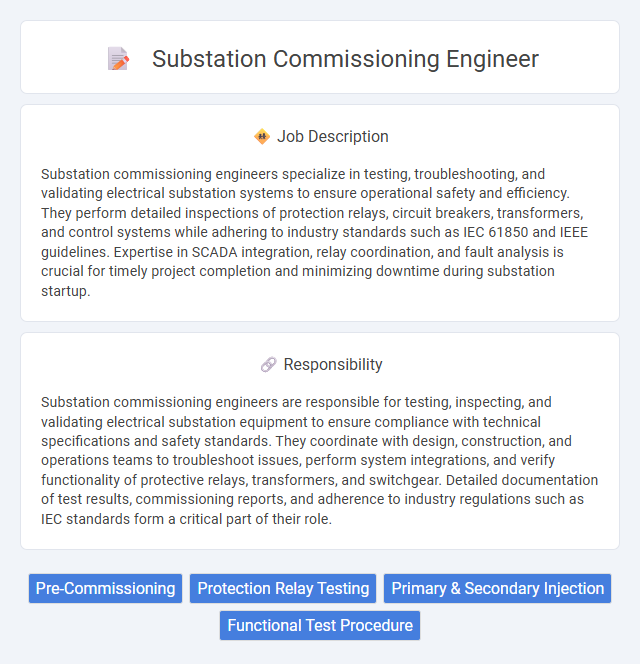
Substation commissioning engineers specialize in testing, troubleshooting, and validating electrical substation systems to ensure operational safety and efficiency. They perform detailed inspections of protection relays, circuit breakers, transformers, and control systems while adhering to industry standards such as IEC 61850 and IEEE guidelines. Expertise in SCADA integration, relay coordination, and fault analysis is crucial for timely project completion and minimizing downtime during substation startup.
Individuals with strong analytical skills and a keen attention to detail are likely suitable for a substation commissioning engineer role due to the technical complexity involved. Those who can work effectively under pressure and possess good communication skills may have a higher probability of success in coordinating with multidisciplinary teams during commissioning processes. Candidates lacking technical proficiency or struggle with troubleshooting might find this position challenging or less fitting.
Qualification
A Substation Commissioning Engineer typically requires a bachelor's degree in electrical engineering or a related field, alongside professional certifications such as IEEE or IEC standards expertise. Proficiency in testing and commissioning high-voltage equipment, relay protection systems, and SCADA integration is essential. Strong knowledge of electrical codes, safety regulations, and hands-on experience with power transformers and switchgear ensures effective substation commissioning.
Responsibility
Substation commissioning engineers are responsible for testing, inspecting, and validating electrical substation equipment to ensure compliance with technical specifications and safety standards. They coordinate with design, construction, and operations teams to troubleshoot issues, perform system integrations, and verify functionality of protective relays, transformers, and switchgear. Detailed documentation of test results, commissioning reports, and adherence to industry regulations such as IEC standards form a critical part of their role.
Benefit
Substation commissioning engineers probably gain considerable benefits, including hands-on experience with advanced electrical systems and enhanced troubleshooting skills. Their role likely offers opportunities for career advancement in the power industry and potential exposure to innovative technologies. The position may also provide competitive salaries and the chance to contribute to reliable electricity delivery, which can be professionally rewarding.
Challenge
Substation commissioning engineers likely face the challenge of ensuring the accurate installation and testing of complex electrical equipment under tight deadlines, which may require precise coordination with multiple stakeholders. They probably must navigate unexpected technical faults and system discrepancies during the commissioning process, demanding quick problem-solving skills and adaptability. Managing high safety standards while working in potentially hazardous environments could also present significant pressure throughout their tasks.
Career Advancement
Substation commissioning engineers play a critical role in ensuring electrical substation systems operate reliably, leading to opportunities for specialization in protection system design and automation controls. Expertise gained through commissioning projects enhances qualifications for roles such as senior engineer, project manager, or technical consultant within the power industry. Continuous skill development in SCADA systems, relay coordination, and regulatory compliance drives career growth and leadership positions in utility companies and engineering firms.
Key Terms
Pre-Commissioning
Substation commissioning engineers specialize in pre-commissioning activities such as testing protection relays, verifying grounding systems, and inspecting switchgear components to ensure compliance with design specifications and safety standards. They conduct comprehensive functional tests on equipment like transformers, circuit breakers, and control panels to identify and rectify potential issues before energization. Expertise in electrical schematics, standards like IEC 61850, and coordination with construction teams is critical for successful pre-commissioning execution and minimizing operational risks.
Protection Relay Testing
Substation commissioning engineers specializing in Protection Relay Testing play a critical role in ensuring the safety and reliability of electrical power systems. They perform meticulous testing, calibration, and validation of protection relays to detect faults and isolate electrical equipment during abnormal conditions. Expertise in relay settings, secondary injection testing, and adherence to industry standards like IEC 61850 optimizes system protection and operational efficiency.
Primary & Secondary Injection
Substation commissioning engineers specialize in Primary and Secondary Injection testing to ensure the accurate functioning and safety of protection relays and circuit breakers in electrical substations. Primary Injection tests simulate actual fault currents by injecting high current through the equipment, verifying the performance of the entire protection system under real-world conditions. Secondary Injection involves injecting low-level currents into relay control circuits to validate relay settings and logic without energizing the equipment, crucial for preventive maintenance and commissioning accuracy.
Functional Test Procedure
Substation commissioning engineers specialize in executing Functional Test Procedures to verify the correct operation of electrical equipment such as circuit breakers, relays, and transformers. These tests ensure compliance with design specifications and safety standards by systematically validating protection schemes, interlocking, and control circuits. Accurate documentation and troubleshooting during functional testing minimize commissioning delays and enhance substation performance reliability.
 kuljobs.com
kuljobs.com